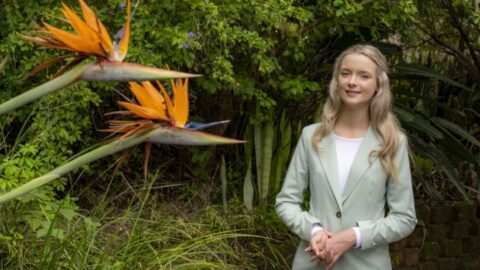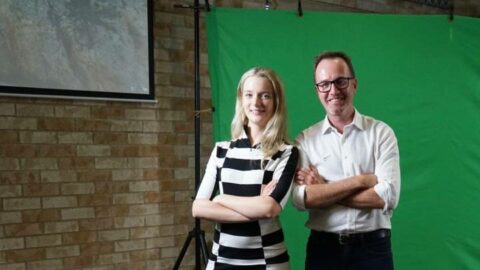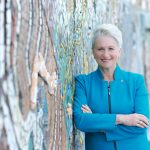A Progressive Voice for Change: An Interview With Greens for Page Kashmir Miller

As the May 21 federal election draws closer, Australian politics is perhaps in the gravest state it has ever been.
The last three years of the Morrison government has been marked by multiple crises coupled with an inability and outright refusal to adequately approach them.
With the pandemic subsiding, as it was always going to, along with its related grievances, we’re again left with the direst crisis humanity has ever faced: mounting climate change. Once thought to be a far-off problem likely to impact far-off lands, we’ve now seen this country become ground zero.
And with the Morrison government having shown a complete reluctance to attempt to abate the issue of the heating planet, but rather roll out policies to the contrary, the public is now well aware that the idea the Coalition is completely captured by the fossil fuel industry is no exaggeration.
So, there’s a growing understanding that it’s time to vote for non-traditional progressive politicians who understand the science and recognise that most of the community is more concerned with the survival of the many than the short-term profits of the few.
Frontline vision
Living in the NSW Northern Rivers region, Australian Greens candidate for the lower house seat of Page, Kashmir Miller, knows all too well the devastation that climate-driven extreme weather events are having.
Miller’s hometown of Lismore and others close by were almost completely wiped off the map of late.
The Greens candidate is also well aware that NSW premier Dominic Perrottet’s assertion that the floods that hit the eastern seaboard in late February were a “one-in-a-thousand-year-event” was way off the mark, as they already transpired again just weeks later.
As a 22-year-old law student with a focus on environmental law, Miller is offering policies with a vision for a sustainable future, not a last-ditch grasp for profits by rich old white men, who gleefully drove us directly into this crisis, sniggering along the way.
Miller is pushing for an immediate transition towards renewables that entails bringing along the workforces from the dying industries to partake in the green revolution that will ensure a future for their families, affordable housing and the ongoing life of this planet.
A young woman’s insight
To deny that the 2019 Black Summer bushfires were a climate-driven catastrophe was difficult in the face of the mounting science but to continue to refuse to accept that global warming isn’t contributing to the ongoing floods we are experiencing is entering the realms of madness.
In terms of the division of Page, Kevin Hogan has held the seat since 2013, and he’s a National: the greatest climate deniers of all.
Indeed, a vote for Miller from the constituents of Page is a vote for the future of their children, for future employment, and a future where the present uncertainty dramatically subsides.
Sydney Criminal Lawyers spoke to Greens candidate for Page Kashmir Miller about the Coalition’s inability to deal with the consequences of the floods, the benefits of adequately taxing billionaires, and why she considers Medicare should cover mental health.

Kashmir, you’re running for the Australian Greens in the federal electorate of Page. Currently, the lower house seat has been held by Nationals MP Kevin Hogan since 2013.
This division covers much of the areas worst hit by the recent unprecedented floods. And on 4 April, you quizzed NSW premier Dominic Perrottet about his government’s approach to the extreme weather events and their aftermath.
How would you describe the way the Liberal Nationals have been dealing with this situation? And do you think it’s going to impact the way locals vote in the upcoming election?
The Liberal Nationals government at the state and federal levels have taken a way to this that doesn’t address the core issues.
A lot of their response has been throwing money at engineering solutions, and building more infrastructure and bigger levies, in the hope that it’s going to solve the problem.
In reality, people in Lismore and around Page who have been heavily affected know that we need a much more nuanced and multi-pronged approach to how we deal with this flood recovery.
And they realise that this is not something we can just push away, build a bigger levy and hope that it won’t happen again.
These sorts of climate catastrophes are only on the increase, and we can’t consider it to be something that can be solved with just one solution.
So, this will impact the way that locals vote in the upcoming election.
The Greens want to see changes in the way that we plan towns and the environment, in terms of climate change no longer being something we see as far off in the distance, and therefore, we can look to reducing emissions by 2050.
We need to see that the government is looking at what’s happening now and bring in the real change that’s so important, as this is going to impact our future and people’s homes.
Every time it rains now people don’t feel safe in their homes. Instead, they’re worried about how much water we could get.
We hear the word unprecedented a lot these days, as many things continue to be more and more unprecedented, so we don’t know what to expect.
To think that we can just engineer our way out of living in a flood basin, which is prone to these sorts of floods, is just illogical. So, we need to look at the way we do this.
We need to give people options, whether that be a land swap with the government – the Liberal government at the state level with help from the federal level – so we can give people the option to move from their homes with a scheme that gives them peace of mind.
But also, for people who want to remain living here, the government needs to give them peace of mind in that it’s doing what it can to stop these climate catastrophes.
You’re currently studying law with a focus on environmental law, and, as a resident of Lismore, you’ve just experienced the devastation of the floods.
The Morrison government’s practice over the last three years has been to enact policies that enhance climate change, while what Labor has on offer isn’t that much better.
So, what sort of action do you consider needs to be taken to effectively deal with the climate crisis? And considering the majors refuse to act, how will we see this come about?
I agree with what you’re saying about what Labor has on offer isn’t being much better than the Liberals because both of them have put the target at 2050 for net zero emissions, and that’s not good enough.
That’s 28 years away, and we need to start considering this a major problem and dealing with it immediately.
And we have to plan out a just transition, so that workers and families who are still reliant on mines and fossil fuels can transition into a safer long-term workforce.
That’s why we have set the goal of 2030 for net zero emissions. Net zero emissions looks and feels for everyday Australians as more than just cutting fossil fuels and that job industry, as it means creating an economy and a workforce for everyday Australians that is greener.
Then they can gain employment in solar and other sorts of renewables, that can make Australia a green technology superpower.
We have that ability in Australia. We’ve seen it in South Australia in the way that they’ve been tackling climate action, which has been a real leading point that the rest of the country should look at.
So, we need to look at more than just transitioning away from fossil fuels but also considering what renewable Australian economies will look like.
That’s why the Greens have been developing these policies, listening to the science and listening to people in communities at the grassroots level in terms of what they want to see Australia look like after fossil fuels.
Considering the major parties have refused to act upon it, we hope to see this best coming about by a Labor government creating better actions following the next election.
And the way we’ll see that is to ban these large corporate donations from fossil fuel companies that the majors are receiving, which puts them in the back pockets of mining and gas companies.
These companies are then receiving tax cuts and subsidies in return, which is unacceptable when we need to take the path to transition to renewable energies.
This is a serious state capture issue and infringes upon accountability for these major companies.
So, with the Greens in balance of power one of the main things we will be pushing for is taxing billionaires and the mining companies to help pay for this transition, because we’re not in their back pockets.
You’ve been active in politics since the age of 12, and you’ve partaken in numerous protest actions since then. As you know, the NSW government has just passed laws that basically ban effective protest with a specific focus on climate defenders.
What’s your take on this development, and more broadly, on the way that both levels of the Coalition have been dealing with dissenting opinions in general?
These laws are completely unacceptable. In a democratic society, like Australia, we shouldn’t be pushing away dissenting opinions and criminalising them just because they disagree, are wanting to be heard on climate inaction and are showing their disappointment with government inaction.
So, at both levels, and with both major parties, you can’t just silence dissenting voice by making it illegal, because then that dissenting voice is going to grow.
Instead, we should be listening to these people. They shouldn’t have to be out on the streets protesting. We should be inviting them into parliamentarians’ offices and into parliament and listening to them and taking them seriously.
To criminalise such an important part of the democratic process, such as protest, is unacceptable from both major parties.
We’ve seen a significant increase in the power of protest with young people and the School Strike for Climate, which is something that I celebrate.
This issue is not something that’s going to go away because of these laws. Young people are ready to protest and take to the streets with what they want to see from our government because they’re not listening to our voices.
In an ideal world, we wouldn’t need protest because our politicians would listen to this rising passionate voice for climate action. And no matter how many laws that they create, it’s not going to go away.
They can’t silence us with these laws. And it’s very important to remember here that this is them trying to silence us and we can’t let them win.

Another key issue you’re prioritising is affordable housing. In your understanding, why is this such an issue in this country? And what sort of action needs to be taken to solve it?
Affordable housing was already an issue across Australia, particularly in the northern regions of NSW in the electorates of Page and Richmond because of the surge of property prices in recent decades.
Decades of government have wrecked the prices in the housing market with decades of big developers, which is worsening housing inequality. This has been going on for many years now.
With the recent floods, this issue has expanded dramatically and has become one of the biggest issues of this election alongside climate action.
What we need is for this to be understood for the issue that it is, that the locals of Lismore, Page and around the north of NSW are being pushed into homelessness.
So, the action that needs to be taken is a focus on and money to be put into public and community housing. That’s whether it’s shared ownership with help from the government or the creation of public housing through the state and federal government, in order to help end this homelessness.
This would also create a huge job market from the building of this housing. Our Greens plan is to create 150,000 new public homes, which would create up to 135,000 jobs in construction and services.
This would support Australia’s economic recovery and the recovery of our region post-floods.
So, the government needs to stop giving favourable tax breaks to big developers and start putting that money back into public and community housing, because we have the power to end this homelessness and affordable housing crisis.
This should be a priority at the top of any incoming government’s list because the homelessness around Lismore and Page is just going to continue. It’s not going to go away, because many people don’t feel safe to move back into their homes.
The last 12 months in federal parliament have been shocking in relation to issues that specifically affect women on multiple levels. Underrepresentation in parliament is just one aspect.
If you take out the seat of Page, you’ll not only be another voice for women in parliament, but as you’re 22 years of age, you’ll be a voice for young women.
What sort of impact do you think your presence as a young woman will have?
I’m happy that you asked this, because that is something that I have been using in my campaign as I find it really important because being a young woman, and particularly young at 22 years of age, I consider this my superpower in this election.
This is something that I am proud of, that some people have tried to use against me.
I’m going into the election gladly as a young Australian and a young woman because we are such an underrepresented group in parliament.
We are not being heard from. And going into the House of Representatives, I want to see a lower house that’s diverse, rather than one that looks like the old model with parliamentarians who are typically older white middleclass men.
That has been the norm for so long, and obviously, it’s not working. So, there is a real space for women at this time to bring a fresh perspective.
I’ve personally been engaged in politics since I was younger than 12. And I have the passion and the knowledge, just like any other political candidate does. Age has nothing to do with what you have to offer.
If I was 12 and I saw somebody who was 22 – just ten years older than me – having a chance of being a parliamentarian and taking that voice into parliament, where it can be heard best in making change for the future, I would find it so inspiring.
That’s what I hope to deliver in this campaign and into parliament: to continue to be a voice for the future, because I know how it feels to see these older people making these decisions that are going to impact me more than anyone else.
Especially in terms of young women. The way we have seen young women being treated, especially in the Liberal government has just been disgusting, whether that be sexual assault allegations or belittling mistreatment of women.
People don’t realise how alive and well patriarchal values and discrimination still are in what is meant to be the most important house in the country.
The fact that this is so acceptable is shocking to hear. But now I’ve gotten used to the idea, it has settled in me and created a real storm of inspiration and passion to go in there and change it from the inside.
We need these voices in Parliament House to change it, because they’re not listening to outside voices.
So, the only way to bring the change is to get up there and get our voices out as loud as they can be, and I will be so honoured to be that voice for young people and especially for young women.
You say that you’re happy I asked that question. I did ask because I see that having more young women in parliament with their fresh perspectives would go a long way to solving a lot of the issues that are going on.
Absolutely, young women shouldn’t be underestimated. We are energised, inspired and ready to go for the long run. Young women would make such a difference if they were let into Parliament House more often.
And lastly, Kashmir, despite much of the doom and gloom we’ve covered, there’s a growing understanding that as the majors aren’t prioritising the wants or even the needs of the people, it’s likely progressive candidates, like yourself, will be occupying a greater number of seats next term.
So, given this, what sort of changes do you think it will result in? And further, what other key issues will you be prioritising in such a political environment?
Having the Greens occupying more seats in both the upper and lower houses will mean that we can be put in balance of power, and that is such an important role for a progressive party like the Greens to be in.
What it means is, whatever major party is in power, they’ll be reliant on us to get their legislation through, so we will have the power to make the amendments that are necessary for whatever legislation is going through to really make an impact for climate and social justice.
Some of the issues we will try and implement once we are in balance of power is to get a federal anticorruption body that has teeth to hold politicians accountable.
We haven’t gotten that so far because no government has been brave enough to put forward something that they know could impact them in how they run their politics.
The corruption in Parliament House must stop. We’ve seen over the past couple of years the crumbling from the inside of the Liberal government, whether that be with sexual assault, pork barrelling and much more.
Also, we need to strengthen our healthcare, because our frontline workers have been our heroes during the last few years of COVID. So, we need to prioritise mental health into Medicare.
As a huge part of our recovery from the floods, putting mental health in Medicare is going to be such an important issue.
The mental health repercussions of these floods are going to be an ongoing issue for years from now, and we need to start planning for that urgently or we’re going to have a mental health crisis.
It is already beginning in the Northern Rivers from the floods, and there is going to be huge amounts of trauma throughout my community, and I really want to see this looked after in parliament.
Mental health should be seen as important as any other aspect of health because mental health problems are on the rise.
And finally, another key issue is the taxing of billionaires. One in three big corporations pay no tax, and during the pandemic 47 billionaires doubled their wealth to $255 billion, while people are homeless on the streets in the Northern Rivers after the floods.
In balance of power that is what we want to do, make the big corporations and billionaires pay their fair share of tax so that we can get these things like dental and mental health into Medicare, so that we can get affordable public housing, and so we can transition into renewables in a way that’s going to help everyday Australians find a job and have a future to look forward to.







